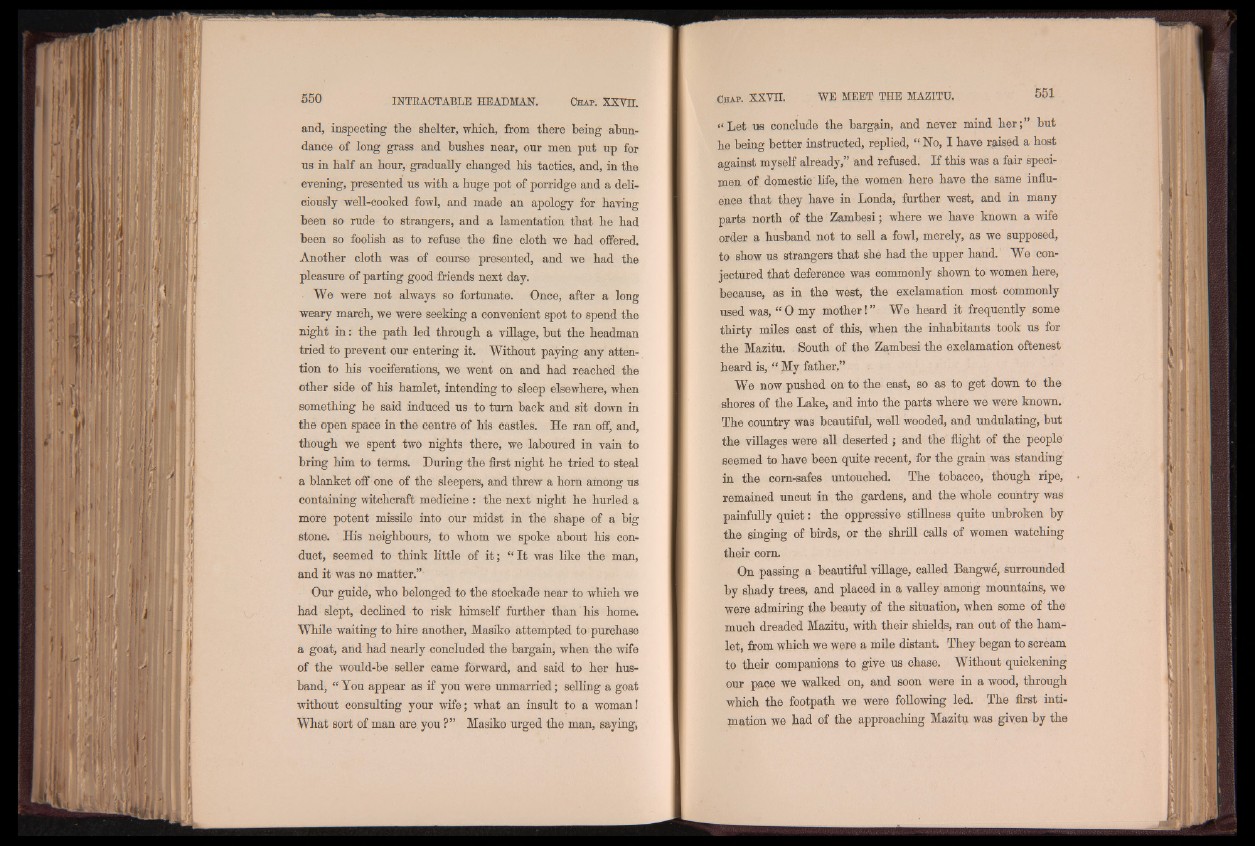
and, inspecting the shelter, which, from there being abundance
of long grass and bnshes near, onr men put up for
us in half an hour, gradually changed his tactics, and, in the
evening, presented us with a huge pot of porridge and a deliciously
well-cooked fowl, and made an apology for having
been so rude to strangers, and a lamentation that he had
been so foolish as to refuse the fine cloth we had offered.
Another cloth was of course presented, and we had the
pleasure of parting good friends next day.
We were not always so fortunate. Once, after a long
weary march, we were seeking a convenient spot to spend the
night in : the path led through a village, but the headman
tried to prevent our entering it. Without paying any attention
to his vociferations, we went on and had reached the
Other side of his hamlet, intending to sleep elsewhere, when
something he said induced us to turn back and sit down in
the open space in the centre of his castles. He ran off, and,
though we spent two nights there, we laboured in vain to
bring him to terms. During the first night he tried to steal
a blanket off one of the sleepers, and threw a horn among us
containing witchcraft medicine : the next night he hurled a
more potent missile into our midst in the shape of a big
stone. His neighbours, to whom we spoke about his conduct,
seemed to think little of it; “ I t was like the man,
and it was no matter.”
Our guide, who belonged to the stockade near to which we
had slept, declined to risk himself further than his home.
While waiting to hire another, Masiko attempted to purchase
a goat, and had nearly concluded the bargain, when the wife
of the would-be seller came forward, and said to her husband,
“ You appear as if you were unmarried; selling a goat
without consulting your wife; what an insult to a woman!
What sort of man are you ?” Masiko urged the man, saying,
“ Let us conclude the bargain, and never mind h er;” but
he being better instructed, replied, “ No, I have raised a host
against myself already,” and refused. H this was a fair specimen
of domestic life, the women here have the same influence
that they have in Londa, further west, and in many
parts north of the Zambesi; where we have known a wife
order a husband not to sell a fowl, merely, as we supposed,
to show us strangers that she had the upper hand. We conjectured
that deference was commonly shown to women here,
because, as in the west, the exclamation most commonly
used was, “ 0 my mother! ” We heard it frequently some
thirty miles east of this, when the inhabitants took us for
the Mazitu. South of the Zambesi the exclamation oftenest
heard is, “ My father.”
We now pushed on to the east, so as to get down to the
shores of the Lake, and into the parts where we were known.
The country was beautiful, well wooded, and undulating, but
the villages were all deserted ; and the flight of the people
seemed to have been quite recent, for the grain was standing
in the com-safes untouched. The tobacco, though ripe,
remained uncut in the gardens, and the whole country was
painfully quiet: the oppressive stillness quite unbroken by
the m'nging of birds, or the shrill calls of women watching
their com.
On passing a beautiful village, called Bangwe, surrounded
by shady trees, and placed in a valley among mountains, we
were admiring the beauty of the situation, when some of the
much dreaded Mazitu, with their shields, ran out of the hamlet,
from which we were a mile distant. They began to scream
to their cpmpaniops to give us chase. Without quickening
our pace we walked on, and soon were in a wood, through
which the footpath we were following led. The first intimation
we had of the approaching Mazitu was given by the